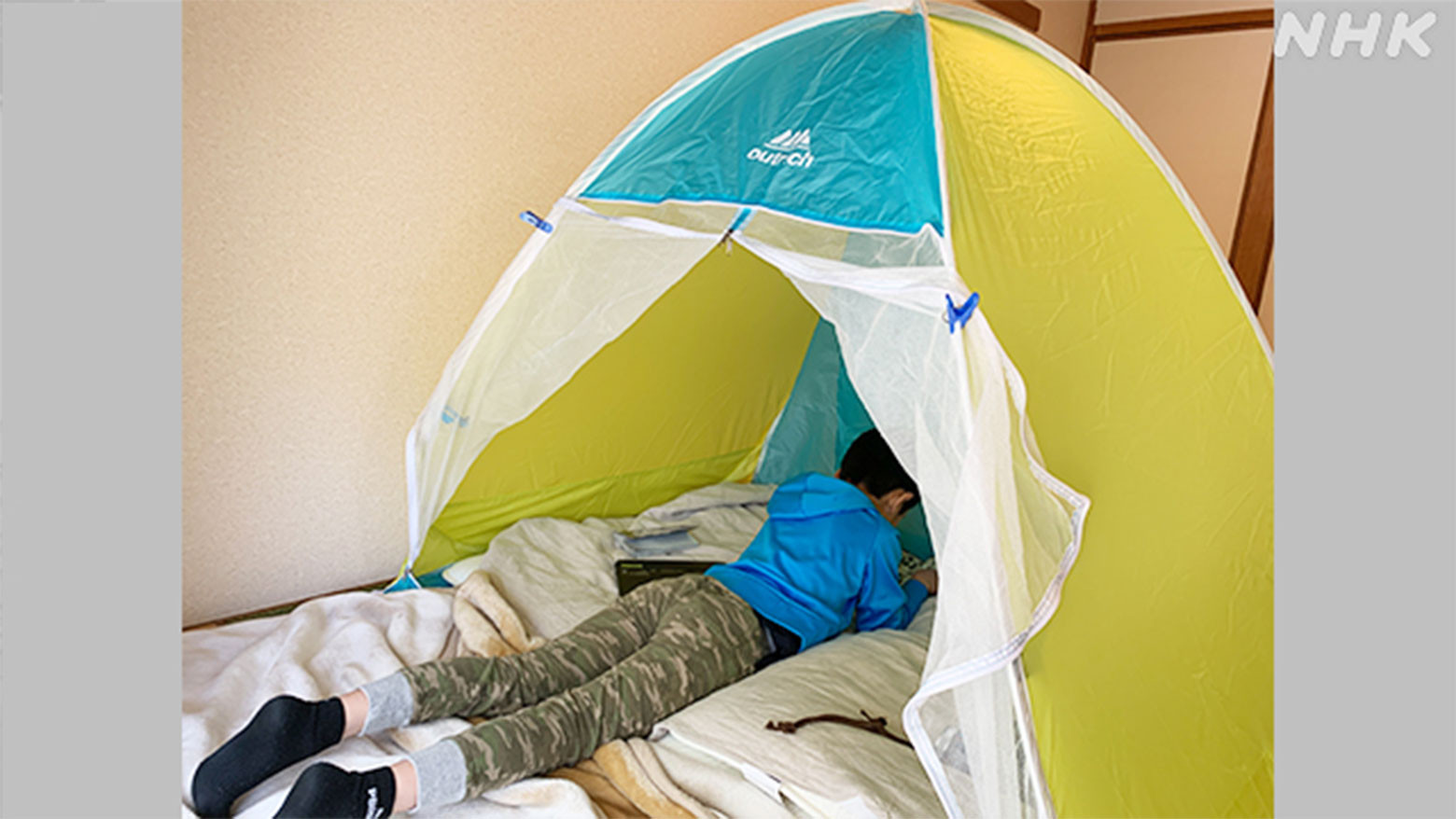“Secret base”
Earlier this month, a mother of two boys in Saitama Prefecture set up a tent on her balcony. Her goal was to give her kids something to enjoy, even as they are forced to stay at home all day.
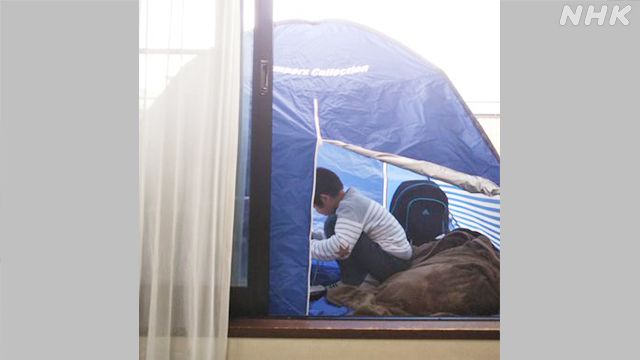
The mother says her boys took toys, blankets, and backpacks out into the tent, and had a good time in their “secret base.” They ended up eating dinner and spending the night inside the tent.
“I was so glad,” says the mother. “They were really into it and seemed to be enjoying themselves. I was finally able to do my own thing and have some free time.”
Tent sales booming
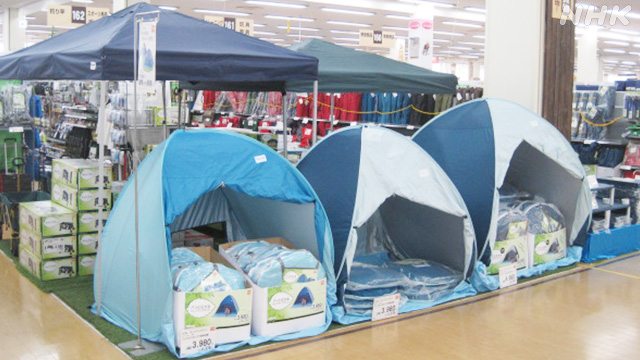
DCM Holdings Co., a leading home improvement retailer with more than 670 outlets around Japan, says tent sales in the beginning of April have increased about threefold since the end of March. The top-seller is the “pop up tent”, a type that can be assembled with just a single touch of a button.
“Our tents are usually used for outdoors activities,” says a DCM public relations official. “But because of the coronavirus, many people are now using them at home—in the house, in the garden, even on the balcony.”
A “base” for adults
Adults are also using tents to get some privacy of their own. The idea of a “base” for grown-ups has drawn attention on social media.
Computer accessories producer Sanwa Supply Inc. says it’s receiving an increasing number of online inquiries this month for its privacy tent.
“It’s now popular among people who are working at home and need to concentrate,” a Sanwa official says. “The tent can even double as a darkroom for photo-lovers, and of course as a shelter in the event of a natural disaster.”
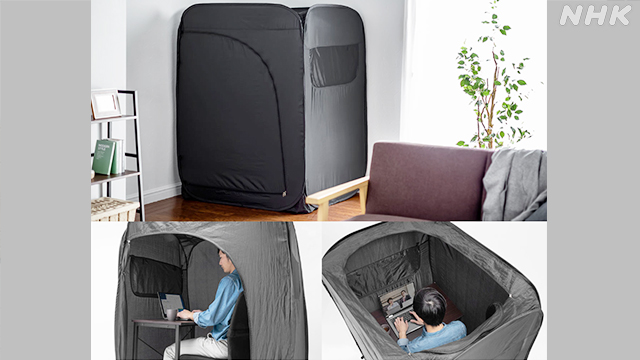
“Kindness tent”
A mother in her 30s living in Tokyo says her two sons, six and four years old, have been fighting every day since their elementary school and kindergarten closed.
“They can’t control their emotions,” she says. “They don’t compromise with each other. They just scream and fight. I tell them to stop but they don’t listen. It was getting really exhausting.”
At her wit’s end, she dug up a tent and set it up in the living room. She put up a sign at the entrance: “Kindness tent.”
The note included four rules:
-Only one person at a time.
-Enter when you feel angry or are crying.
-Once you come out, you will magically be very kind.
-If you both want to enter, take turns.
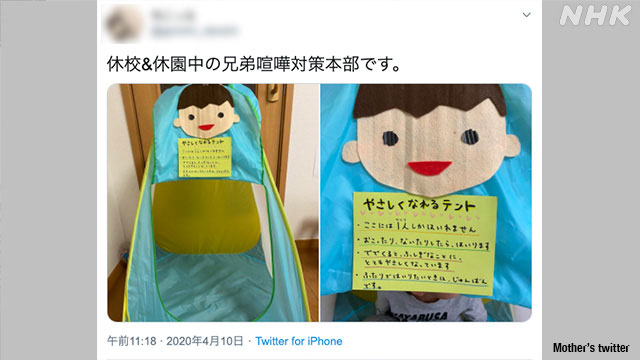
“No end in sight”
She says her boys were very excited when they saw the tent. She says so far, the tent has been very effective. Her sons have followed the rules and always go inside when they seem to be overwhelmed by their emotions.
“The tent has become a place for them to cool down,” she says. “I think the act of going inside and calming down is easier for them to understand than when I just tell them to stop fighting.”
But despite the success of the “kindness tent”, she doesn’t know how much longer her kids can take being at home all day.
“I try my best to help them have fun every day but there’s a limit to what I can do,” she says. “I’m worried as a mother because I can’t see an end in sight. I don’t have any relatives nearby who I can turn to so I can’t relax for even a second. I feel depressed.”
Importance of private space
Why are people stuck at home turning to tents?
Kubota Yuki is a professor at Kyushu Sangyo University in Fukuoka, specializing in clinical community psychology. She says private space is crucial for mental health, in both adults and children.
“Apartments in Japan are small so it’s often difficult for each family member to have a private room,” she says. “They end up seeing each other all the time and this leads to stress. So it’s important to have some space where you be alone, even if it is just a tent. They’re good because when you’re inside, it’s a different experience, it feels unusual. Small houses made out of cardboard boxes are also good.”
How to maintain mental health
Many people may be feeling a sense of uncertainty and worry amid the coronavirus pandemic. But Kubota says there are ways for us to maintain our mental health.
“Excessive fears or concerns about the virus could lead to other negative feelings, like prejudice or discriminatory ideas,” Kubota says. “To prevent this, it’s important to think about other things, things we can control, like tidying the house or planting flowers in your garden. If you can get your mind off the virus and give yourself a sense of accomplishment by doing these small things, that can go a long way toward helping your mind.”
